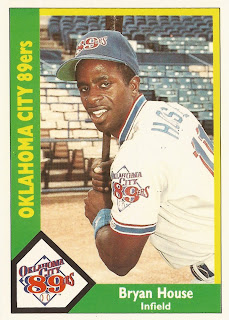In his ninth season with time in the majors, 34-year-old
Gil Heredia started off
hot for the Athletics.
By mid-May, he was 5-2 and had an ERA of 2.52, a mark that put him fourth in the American League,
The Associated Press wrote.
"I take great honor in that,
but statistics are so overrated," Heredia
told The AP as the questions about his early success came. "If I'm successful and
consistent and we're winning games, that's what counts. If this were the
end of the season, then yeah, obviously, I'd have something to say."
By the end of the season, Heredia didn't have the ERA title - his ERA returned to a 4.12 mark - but he did
pick up 15 total wins out of 32 starts, a career high.
Heredia played for the Athletics that year, his 14th overall season as a pro. He went on to play
in just one more.
Heredia's career started in 1987,
taken by the Giants in the ninth round, out of the University of Arizona.
He played his first year between
short-season Everett and single-A Fresno. He made AA Shreveport in 1989, then AAA Phoenix in 1990.
Heredia debuted with the Giants as a September call-up in 1991,
getting into seven games, starting four. He posted a 3.82 ERA in 33 innings.
Heredia returned to the Giants for 13 more outings in 1992, before being traded to the Expos in August. He played with the Expos through 1995, getting as many as 40 outings in a season.
In
1994, Heredia was a part of the Expos team that had the game's best
record when the strike came. By that time, Heredia had already
pitched in 39 games and had a 3.46 ERA.
He arrived with the Rangers for 44 outings in 1996. He played 1997 between
the Cubs and the Expos systems at AAA.
For 1998, though, he arrived with the Athletics, where he would spend
the final four seasons of his career.
He
got eight outings, six starts in 1998. In 1999, his starts increased to
33. He went 13-8, with a 4.81 ERA. In one August start, Heredia
set down 18 in a row.
To
start 1999, Heredia went toe-to-toe with his idol, Roger Clemens.
Heredia went six innings, giving up one earned run in a game the
Athletics
would go on to win.
"Gil did a heck of a job," Oakland manager Art Howe
told reporters later. "In the first two innings, he battled through some tough spots."
He
then went that 15-11 in 2000 in 32 starts. He also got his first
postseason work. In Game 1 of the ALDS against the Yankees, he went six
innings, giving up three earned runs for the win. In the deciding Game
5, he
went just a third of an inning, giving up six earned runs for the loss.
"is final year came in 2001 with 24 outings, 18 starts. That August, Heredia went three scoreless innings in relief,
picking up a win against the White Sox.
"I really have not had a lot of opportunities like today," Heredia
told reporters
after that August 2001 game. "But when they arise, you have to take
advantage of them and do the best you can. The biggest thing is to go
out there and try to throw strikes."
Heredia has gone on to be
a coach in the minors. In 2009, he served as pitching coach at short-season Yakima. In 2012, he is now
in his third year as
pitching coach at rookie Missoula.
"I think we've got ourselves a good group of guys," Heredia
told The Missoulian
in June 2012 of the new squad. "Every single pitcher that's here is
ready and prepared for a challenge. As far as goals, we want them to
have fun out there. We have about three months together and we want them
to make it the best it can be."
- Sonora Union Democrat, April 6, 1999: Heredia matches his idol
- Kitsap Sun, Associated Press, May 15, 2000: M's, A's flipflop again
- USAToday, ticker, Aug. 18, 2001: Athletics vs. White Sox
- Missoula Missoulian, June 17, 2012: O's are back in town
1990 CMC Tally
Cards Featured: 796/880 - 90.5%
Players/Coaches Featured: 807
Made the Majors: 553 - 69%
-X
Never Made the Majors:254-31%
5+ Seasons in the Majors: 247
-X
10+ Seasons in the Minors: 151























